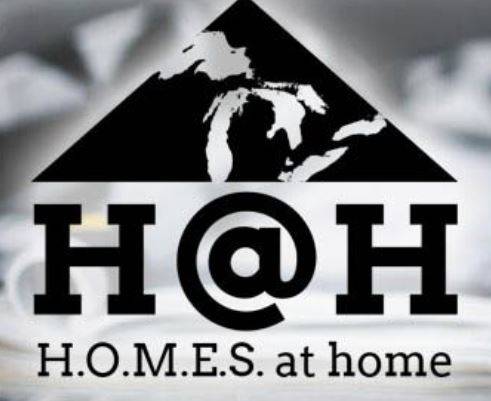Great Lakes Education Resources
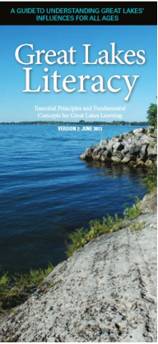
Great Lakes Literacy Principles
Great Lakes literacy is an understanding of the Great Lakes’ influences on you and your influence on the Great Lakes.
- The Great Lakes, bodies of fresh water with many features, are connected to each other and to the world ocean.
- Natural forces formed the Great Lakes; the lakes continue to shape the features of their watershed.
- The Great Lakes influence local and regional weather and climate.
- Water makes Earth habitable; fresh water sustains life on land.
- The Great Lakes support a broad diversity of life and ecosystems.
- The Great Lakes and humans in their watersheds are inextricably interconnected.
- Much remains to be learned about the Great Lakes.
- The Great Lakes are socially, economically, and environmentally significant to the region, the nation and the planet.
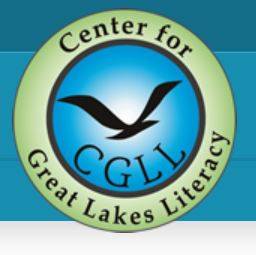
Center for Great Lakes Literacy
The vision of the Center for Great Lakes Literacy (CGLL) is to develop a Great Lakes-literate public capable of effectively contributing to the environmental, economic and social sustainability of the Great Lakes. CGLL is a collaborative effort led by Sea Grant educators throughout the Great Lakes watershed. It offers a number of lessons for download, from board games to outdoor activities.
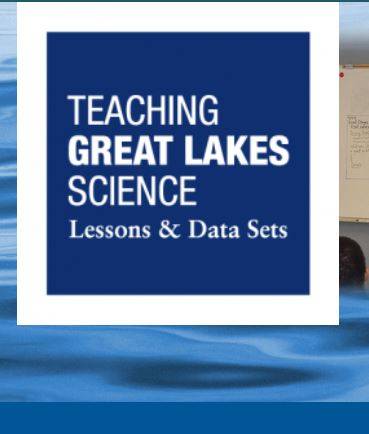
Teaching Great Lakes Science
Teaching Great Lakes Science: Lessons & Data Sets
Michigan Sea Grant's hope is that teachers will be able to use these resources in a way that works best for them. Lessons and data sets are organized into modules. The lessons found in each module are related to the same core concepts; however, each lesson stands on its own and can be explored in any order.
Each lesson consists of a summary, learning objectives and a background that provides a detailed overview of the subject being explored. Data sets include background as well as the actual data collected around the Great Lakes.
H.O.M.E.S. at Home
Want to keep exploring our fabulous Great Lakes, even though you’re hanging around the house? Check out H.O.M.E.S. at Home! The acronym is an easy way to remember our five Great Lakes: Huron, Ontario, Michigan, Erie, and Superior. While it may be harder for us to dip our toes in the lakes right now, we’ve got lots of ways for you to enjoy and learn about our freshwater seas right from your own home.

Great Lakes Now
Great Lakes Now wants to help your students explore the Great Lakes. That’s why they have designed a collection of lesson plans that engage students with the science and study of the Great Lakes. Designed for middle school classrooms, these lessons will help students to become familiar with geologic, geographic, and environmental concepts about the Great Lakes, as well as provide them the opportunity to evaluate contemporary issues facing the lakes.
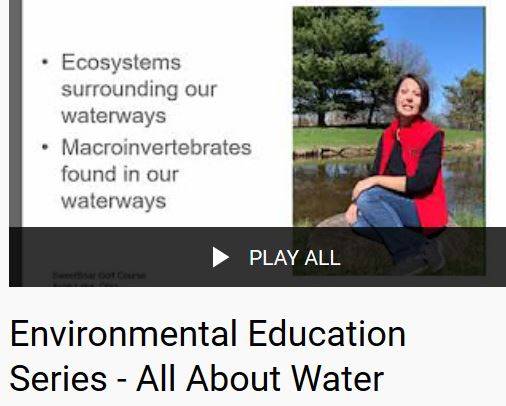
Ohio Sea Grant Environmental Education Series – All About Water
OSU Extension’s Environmental Education Series – All About Water is a collaborative effort to provide middle school students in Lorain County, the surrounding areas and all along the Lake Erie shore with practical, research-based knowledge on water, water quality, and ways that students can make a difference in water pollution prevention. Topics include the Great Lakes, Lake Erie’s physical properties, food webs, storm drains, how kids can make a difference to water quality, macroinvertebrates and ecosystems.

Alliance for the Great Lakes H.O.M.E. School
The Alliance for the Great Lakes is happy to announce H.O.M.E. School, a new series of online lessons about the Great Lakes for kids in grades K-8.
Each lesson explores a different topic with a quick video from our education manager Katie Larson. After the “classroom” portion, students can apply their knowledge with a fun, hands-on activity they can do at home. For educators and those who want to learn more, we offer resources to dig in deeper on the topic with links to other lessons and activities.
Great Lakes Food Webs
The Great Lakes Environmental Research Laboratory (GLERL) has developed food web diagrams for all of the Great Lakes and Lake St. Clair. The major species in each lake are briefly described, along with a diagram summarizing the ecosystem energy flow (who eats or is eaten by whom!).
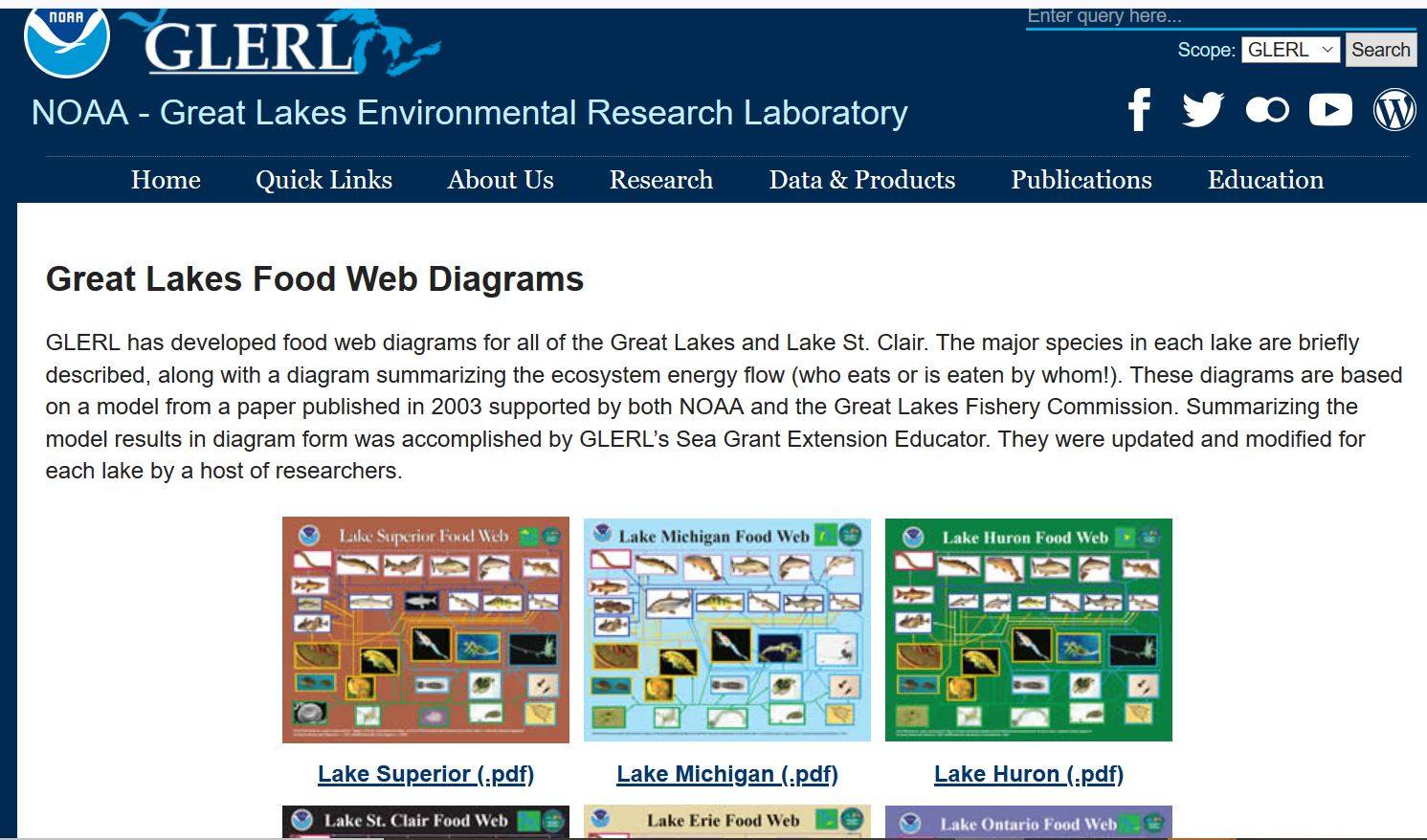
Great Lakes Aquatic Nonindigenous Species Information System (GLANSIS)
GLANSIS is a one-stop website that is all about invasive species in the Great Lakes.
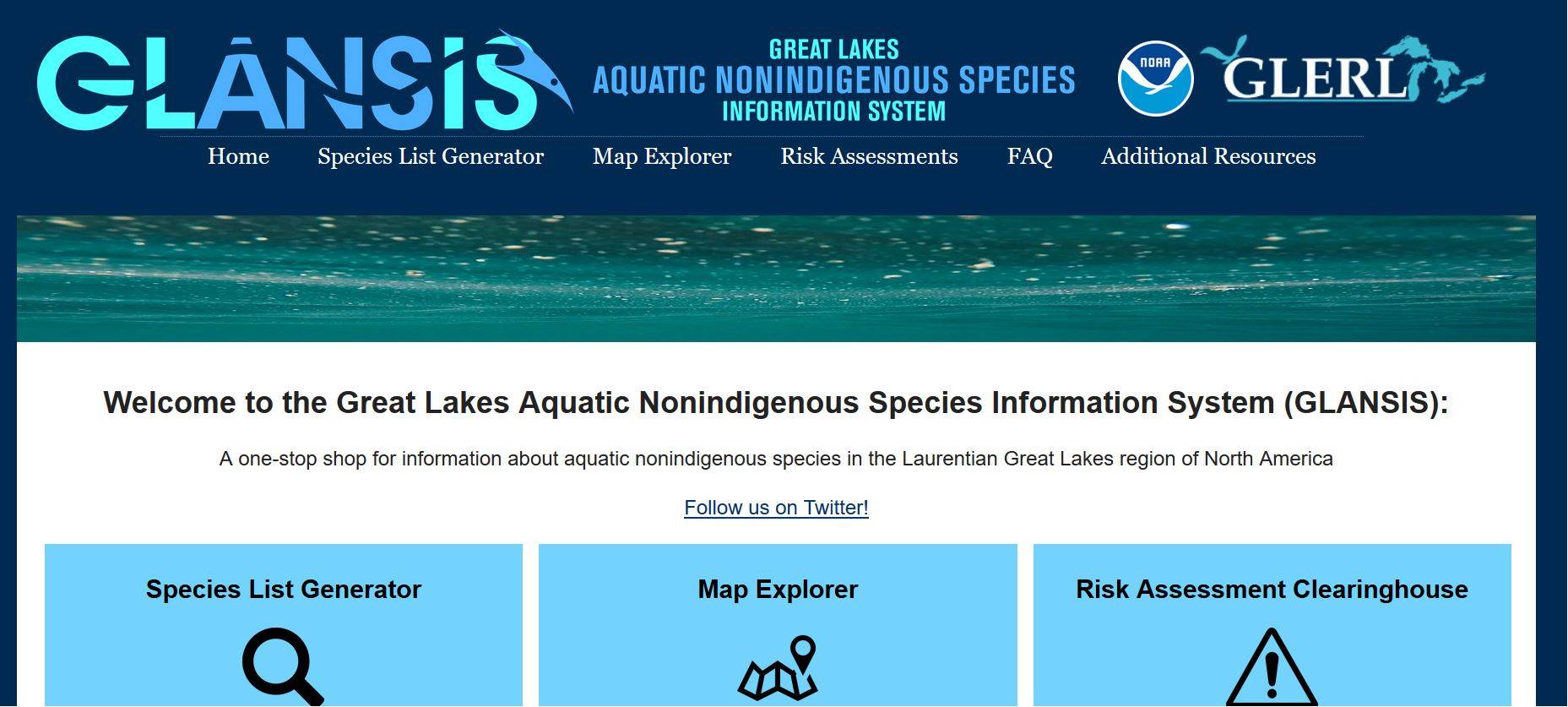
Great Lakes Water Levels
The U.S. Army Corps of Engineers tracks water levels and forecasts in the Great Lakes. Other products are basin conditions and outflows.
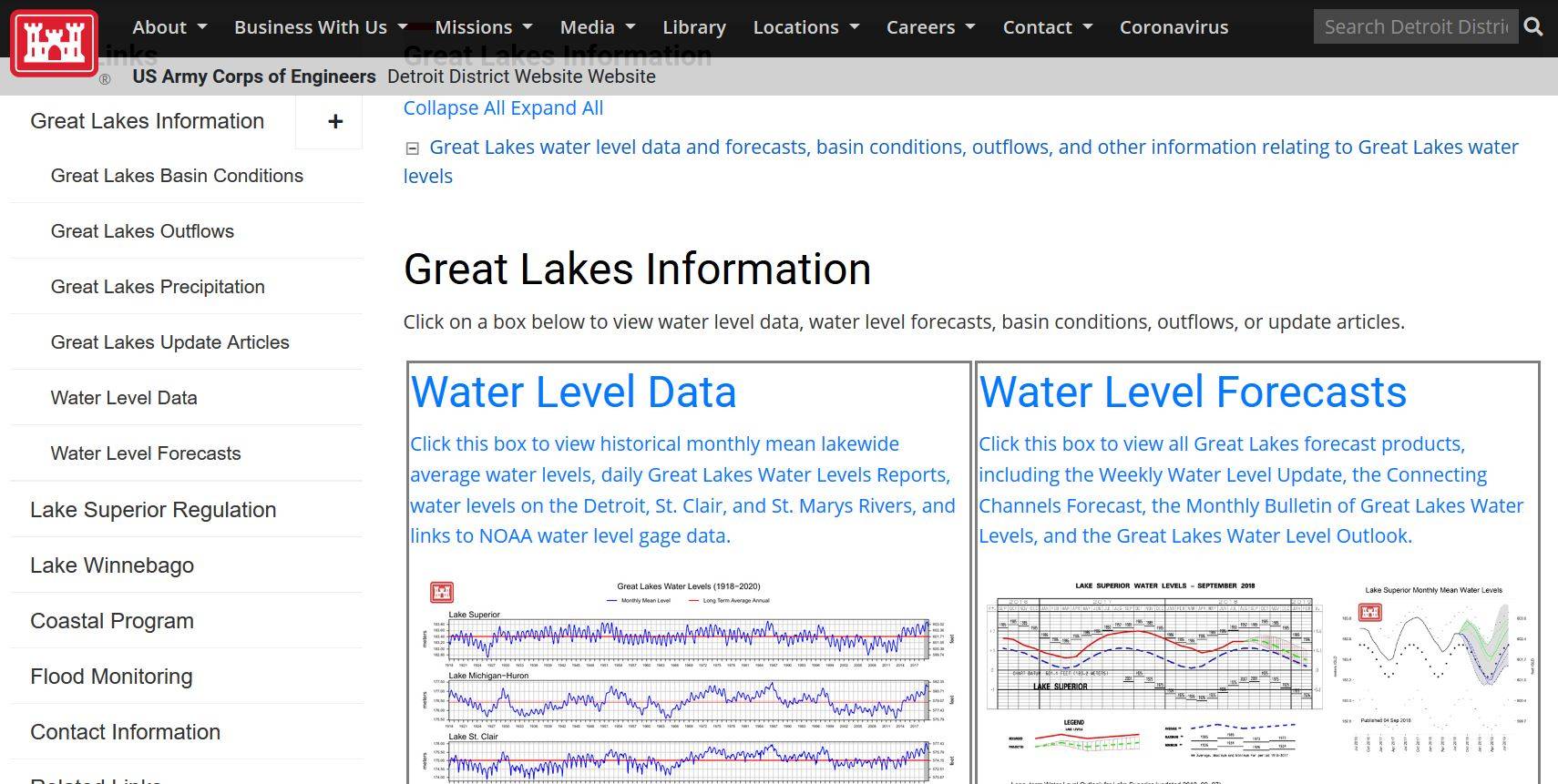
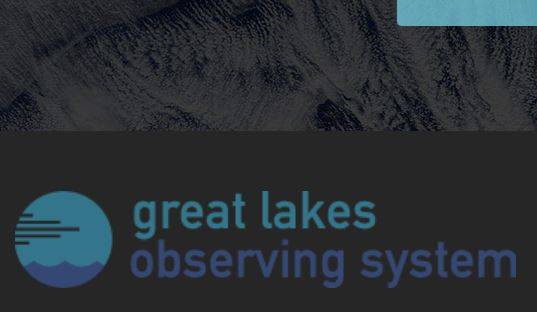
Great Lakes Observing System
The Great Lakes Observing System provides end-to-end data services that support science, policy, management, and industry in the Great Lakes.
Data is made available by partners throughout the region and includes:
- Point observations (winds, waves, water temperature, water levels, air temperature, dissolved oxygen, streamflow, and turbidity)
- Satellite observations (base reflectivity including weather hazards, chlorophyll concentration, colored dissolved organic matter, dissolved organic carbon, natural color, suspended minerals, and water surface temperature)
- Model forecasts (currents, ice thickness, water level, waves, and winds)
Great Lakes Meteorological Real-Time Coastal Observation Network (ReCON)
ReCON has data and webcam observations from throughout the Great Lakes.
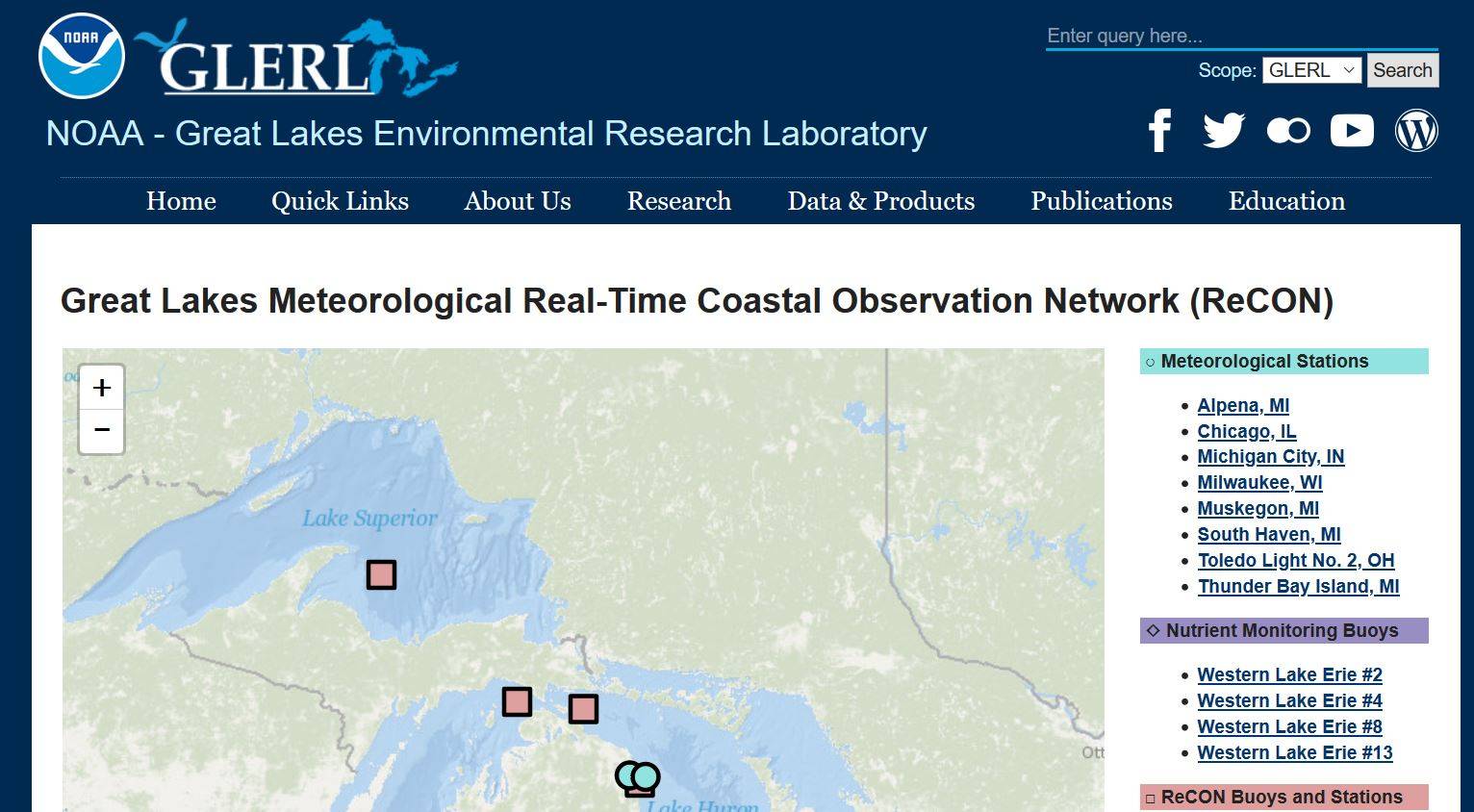

CoastWatch
Check out Great Lakes surface temperatures at CoastWatch. This reporting system is a cooperative project between the NOAA CoastWatch Great Lakes Regional Node located at the NOAA Great Lakes Environmental Research Laboratory in Ann Arbor and the Great Lakes Sea Grant Network.

